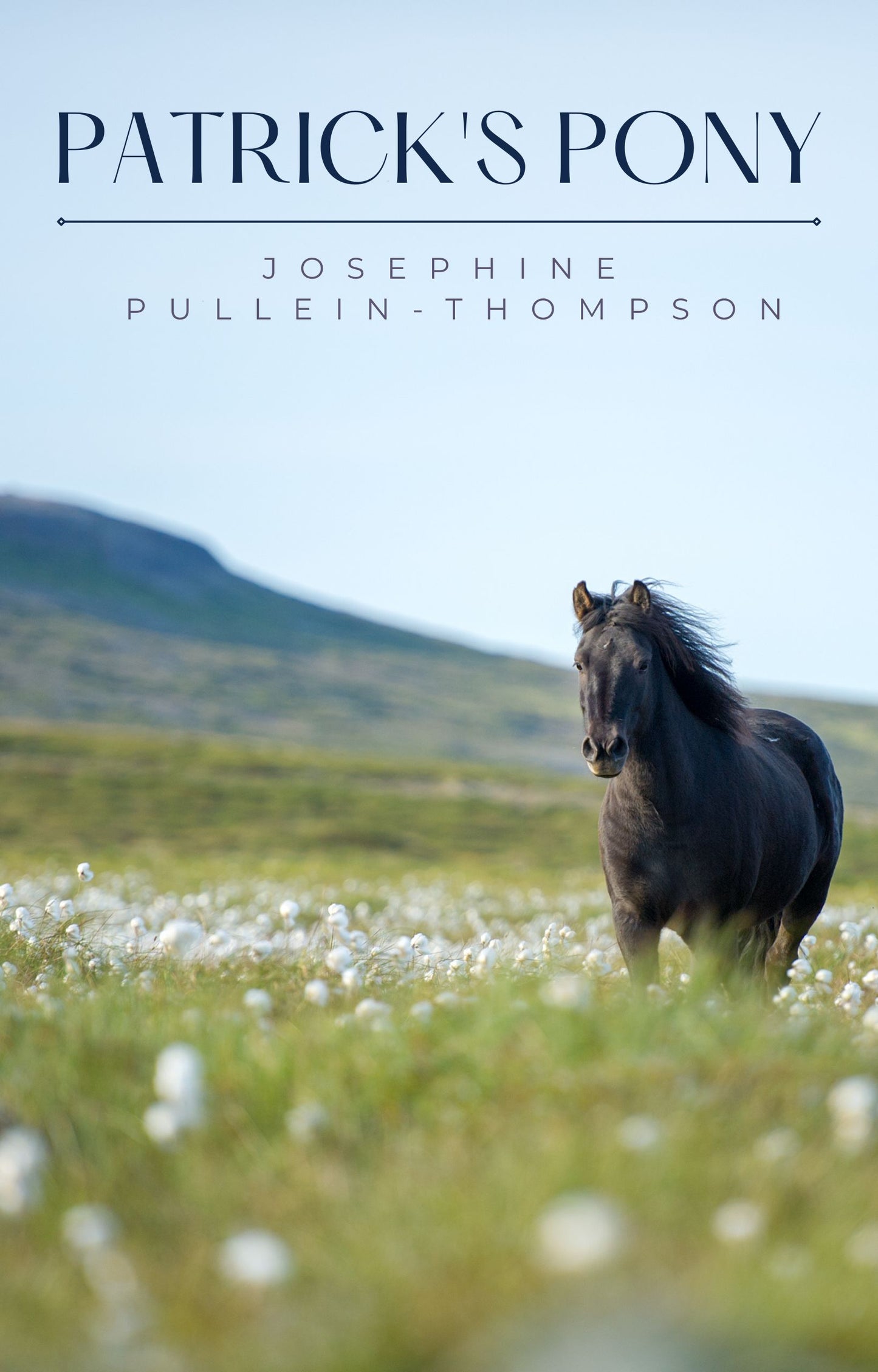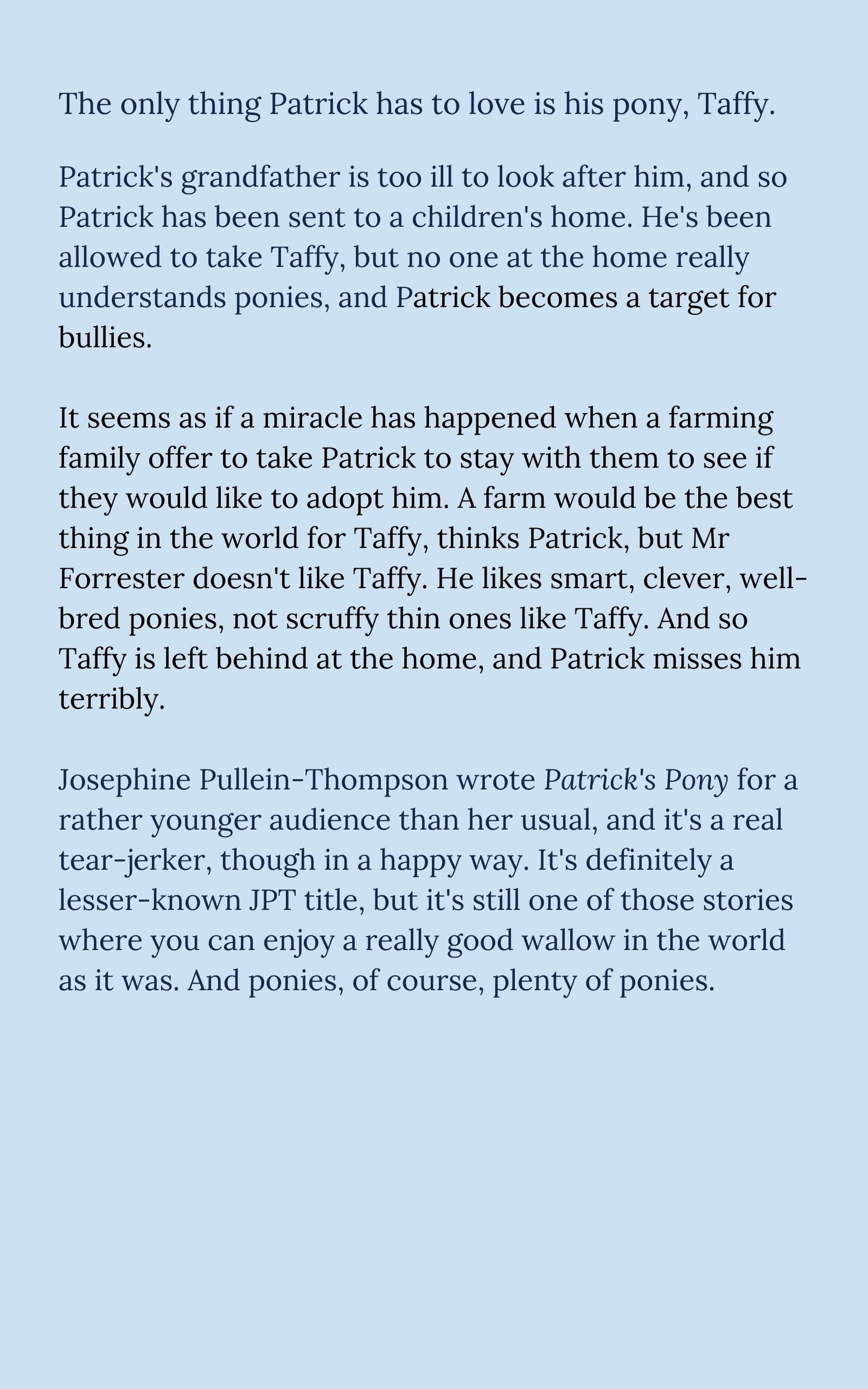Jane Badger Books
Josephine Pullein-Thompson: Patrick's Pony (eBook)
Josephine Pullein-Thompson: Patrick's Pony (eBook)
Couldn't load pickup availability
Share
The only thing Patrick has to love is his pony, Taffy.
Patrick's grandfather is too ill to look after him, and so Patrick has been sent to a children's home. He's been allowed to take Taffy, but no one at the home really understands ponies, and Patrick becomes a target for bullies.
It seems as if a miracle has happened when a farming family offer to take Patrick to stay with them to see if they would like to adopt him. A farm would be the best thing in the world for Taffy, thinks Patrick, but Mr Forrester doesn't like Taffy. He likes smart, clever, well-bred ponies, not scruffy thin ones like Taffy. And so Taffy is left behind at the home, and Patrick misses him terribly.
He is torn between the Forresters, whom he likes, particularly Carol, their daughter, and his misery at leaving Taffy behind. And then he overhears something he shouldn't have about Taffy ... and a whole world of misunderstanding results.
Patrick's Pony was written for a rather younger audience than that Josephine Pullein-Thompson usually wrote for, and it's a real tear-jerker, though in a happy way. It's definitely a lesser-known JPT title, but it's still one of those stories where you can enjoy a really good wallow in the world as it was. And ponies, of course, plenty of ponies.
Page length: 83
Original publication date: 1956
How do I get my book?
How do I get my book?
There's a link to download in your confirmation email. If you need help, the email from Bookfunnel, who handle our delivery, will walk you through downloading the file that works best for you.
How do I read my eBook?
How do I read my eBook?
You can read the ebooks on any ereader (Amazon, Kobo, Nook), your tablet, phone, computer, and/or in the free Bookfunnel app.
Read a sample
Read a sample
It was a sad day for Patrick Hayward when he left his grandfather’s house in Lactonbury and went to live in the Children’s Home on the outskirts of the town.
He felt that, except for Taffy, he was truly alone in the world. His mother had died when he was born and his father two years ago, when he was eight, and now his grandfather was so old and ill that the doctors at the hospital said he would never get any better. It was sad and strange enough going to live in the square, red-brick house with the other children who had no parents, and Mr and Mrs Palmer, who looked after them, but it would have been worse if he had not had Taffy.
All the officials had looked worried when Patrick told them that he had a pony, but he had said that he couldn’t part with Taffy, and at last Mr Palmer had decided that Taffy could come too and live in the small paddock at the back of the house.
There were seven other children living at the Laurels when Patrick arrived there. Three of them—John, Jane and Alice—were younger than Patrick ; he liked them, and they were soon learning to ride on Taffy. But the other four were all older and bigger than Patrick and, led by Brian, they decided that they didn’t like him or his pony.
Rosemary, a large, fat, giggling girl, said that Taffy was the ugliest pony that she had ever seen, and she was always telling Patrick that he hadn’t groomed him properly.
‘He’s dirty—you ought to give him a bath.’ Or, ‘Look at that dust; why don’t you try the vacuum cleaner?’ she shouted after him all day.
Roger thought that ponies were slow. He’d much rather have a car or an aeroplane, and he was always pointing out to Patrick that even bicycles were just as fast as Taffy.
Anne screamed if Taffy went near her, and said that he would bite or kick, but Brian was the worst. He was the sort of boy who must throw stones at something. He didn’t like animals, and this soon caused trouble between him and Patrick.
The fence round the little paddock at the Laurels wasn’t a very strong one, so Mr Palmer had said that Taffy must be tethered on a rope. Every morning, before he went to school, Patrick watered Taffy and moved him to a fresh piece of grass, and every evening he took him out for a ride. He had a bridle, but no saddle, and so he rode him bareback round the lanes. The Laurels was too near the town for there to be rides through fields and woods, but Patrick, who had lived in the town since he was eight and grown used to streets, was quite pleased with the lanes. In fact he thought they were the only good thing about his move to the Laurels.
On the weekdays when they were at school Brian had plenty to do and so he didn’t bother about Taffy, but at the week-ends he would wait until Mr and Mrs Palmer were out of the way, and then he would go up to the paddock and throw clods of earth or little stones at Taffy to make him canter round and round on his tethering rope. Patrick kept watch and would rush to Taffy’s rescue, but Brian was so much bigger that he always won the fight which followed, and Patrick, with black eyes and bruises all over him, would get a lecture from Mr Palmer on the evils of fighting and quarrelling.
One day Brian decided that he would ride Taffy. He jumped on him and hit him with a stick, meaning to impress the other children by galloping up and down the paddock. Taffy, who was usually a very quiet and well-behaved pony, wasn’t going to stand such treatment—he put his head between his knees and bucked Brian straight off. The other children thought this very funny and they laughed about it for several days, but it made Brian hate Taffy and Patrick, who could ride him, more than ever. To avoid trouble, Patrick had to take Taffy for long walks or rides whenever the Palmers were out, or when they were busy in the front of the house and not likely to look out in the garden.
When the summer holidays came Brian seemed to have all day to tease Taffy, and Patrick never dared to leave him for a minute. Added to this, the weather was very dry. The grass stopped growing and the whole paddock was eaten down like a tennis-lawn. Patrick began to worry that Taffy would get thin. He began to worry too about the winter and to wonder how he would buy hay. He felt very miserable—the only times he was happy were when he had Taffy, well away from Brian, grazing the grass at the side of some road or lane.
With so many difficulties to overcome, the first mention of the Forresters seemed like a wish come true. Mr Palmer told him about them one morning after breakfast.
‘Mr Forrester is a farmer,’ he explained. ‘He lives ten miles from here and he has a little girl. He and his wife would very much like to adopt a boy of about your age, if they could find a suitable one; and well, you’d like to live on a farm, wouldn’t you?’
‘Yes,’ Patrick had answered, thinking of Taffy roaming about in large green fields. ‘Yes, I’d like that very much, Mr Palmer.’
‘Well, of course, nothing’s settled. These things take a very long time to decide about, so don’t count on it. The first step will be for you to spend a week or two with the Forresters, to see how you fit in.’
‘Shall I be able to take Taffy to stay?’ Patrick had asked.
‘Well, I really don’t know about that. We shall have to see what Mr Forrester thinks,’ Mr Palmer had answered.
Patrick, feeling certain that a farmer with all those fields wouldn’t mind one little pony, had rushed out to tell Taffy the good news. Soon they would leave the Laurels. Soon Taffy would be able to canter about huge fields. No more standing tethered with a rope, tormented by flies one minute and Brian the next.
Who's in the book?
Who's in the book?
Human: Patrick Hayward, Carol Forrester, Mr Forrester, Mrs Forrester, Jill, Mr Palmer, Brian, Rosemary
Equines: Taffy, Rufus, Pinto
Other titles published as
Other titles published as
Series order
Series order




